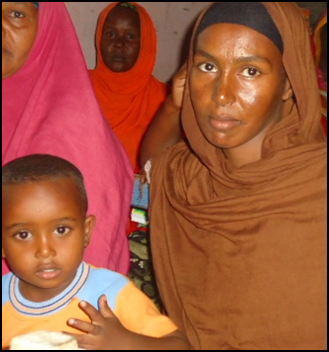
Fatumo Jama Ahmed is a 30-year-old mother of two who lives in Berbera, Somaliland.
Ahmed did not go to school when she was young because, like many Somali girls, she was kept at home. Now, however, she is attending a USAID-supported basic education class, her son by her side.
“I have been studying at this center for one month,” she says. “I am now a completely different person … . I can write my name, I can write and read the Somali numbers and alphabets. After a few months I hope to be fully writing and reading and calculating.”
Ahmed is one of 960 women participating in a free, USAID-sponsored, non-formal education program under the Somali Youth Leaders Initiative (SYLI). USAID’s Somalia stabilization strategy includes providing education outside of formal schools so that students like Ahmed can contribute to creating a positive future in Somalia.
Literate women tend to have healthier and better educated children. They also contribute more to household income and community development than do their illiterate peers. Non-formal education programs give out-of-school youth and adults the opportunity to learn with flexible schedules and at their own pace. Non-formal education also encourages critical thinking and practical skills, such as literacy or counting, to improve farming methods.
USAID provides Somali youth with education as well as opportunities to improve their economic situations and participate in civic activities. Empowering youth reduces the appeal of joining extremist groups or piracy networks and helps them contribute to society in a positive way.
Ahmed will not let her daughter wait until adulthood for schooling. She vows to enroll her when she turns 6.
The goal of the program is to build a future generation of Somali leaders by increasing opportunities in education, economic growth and civic participation for 160,000 Somali youth.







Comment
Make a general inquiry or suggest an improvement.